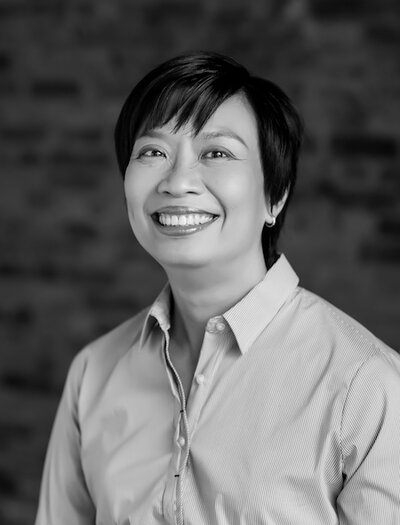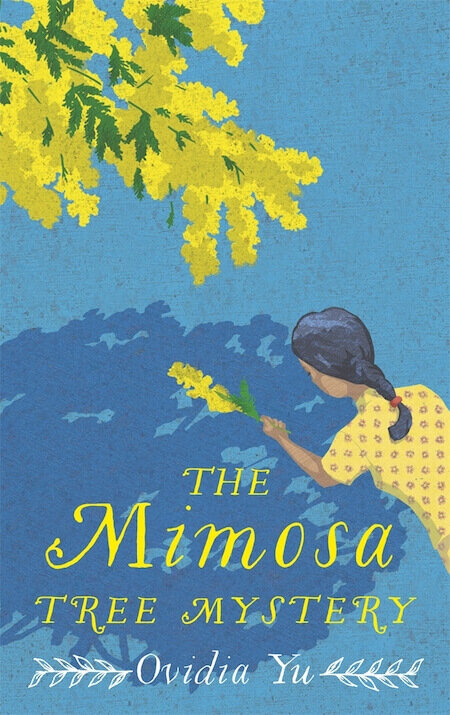Our “I Am Her” series features the female movers and shakers of the industry to learn how femininity and power coincide beautifully and seamlessly together.
The works of Ovidia Yu, an award-winning author from Singapore, prove that there is more than one way to make a powerful statement. Her cosy mystery books, particularly the Aunty Lee series which follows the misadventures of a spirited Peranakan woman with a penchant for solving crimes, are at the surface fun and fascinating but what lies beneath the amusing plot is a social commentary that will make you subconsciously ponder about societal issues. This is Ovidia's speciality — bitter medicine carefully caramelised and served with a comforting scoop of ice cream on top.
Even at the start of her career as a playwright, Ovidia has earned a reputation for being one of Singapore's most controversial writers. She gained international critical acclaim for her entertaining plays such as The Woman in a Tree on a Hill and Three Fat Virgins that are in fact satires about sexism.
In this interview, Ovidia runs us through her creative process, talks about her decision to become a writer after dropping out of medical school and shares what she hopes to achieve with her work.

A portrait of Ovidia Yu
Fill in the blank: I’m a writer, a feminist and ____________.
A blank option that I fill in daily as I go along. Having to stay home during the circuit breaker made me realise how much who I am and what I do comes out of the milieu I’m in and vice versa. We create ourselves and our environments daily, even moment by moment, and if there’s monotony it’s because we fall into patterns and seeing ourselves in certain ways and forget we have choices. Because to conserve energy, we tend to do the same things right down to thinking the same thoughts.
When did your fascination for the written word start?
I loved reading, from when I was very young. My parents worried there was something developmentally wrong with me because I didn’t talk till I was three years old. But when I started to talk they found I could also read. Writing was just an extension of reading. I would write sequels to the books I read. And I remember I would make lists of what the characters’ favourite foods would be and why, so linking food and characters started very early too.
Tell us about your writing process. Which part do you enjoy most? Which part is most difficult?
Mostly I get an idea and play around with it in my head for a while before I decide whether or not to write it down. It may come from something I’ve seen or read about or got mad about. Like there was a woman who adopted a rescue dog, agreeing to return it if the adoption didn’t work out, but instead, she had it put down and lied about where it was. I was so mad I killed her off in a book, Aunty Lee’s Chilled Revenge. It takes longer than lashing out on social media but it’s probably more satisfying. Anyway, I’ve got an 'Ideas Folder' on my computer and about fifteen paper notebooks worth of ideas. And I tell myself if I get stuck I can go in there and root around, but more ideas keep coming so that hasn’t happened yet because more ideas keep on coming.
Then if I decide to work and develop one of them, I’ll sit down and work out whose point of view I’m telling this from and what it’s going to be — I like mystery stories so a lot of them turn out to be mysteries— whether I have scenes or encounters I really want to put in. It’s all great fun coming up with ideas and scenarios. Then the tough part is deciding what’s going on the schedule. Some of this depends on what’s due of course. I’ve got a wonderful agent, Priya Doraswamy of Lotus Lane Literary who reminds me when contract deadlines are coming up.
I give myself two weeks to put down all the ideas I have, write scenes from the contradicting POVs (point of views) of different characters and end up with a huge mass of like two hundred thousand words. And then I decide what happened and whose POV I want to tell the story from and I try to write a first draft of about 120,000 words. The whittling down continues with the next draft and the next draft till I reach about 80,000 words, like reducing stock so that what you get is the essence of the story. Which answers the next part — what I find most difficult is choosing what to leave out. Sometimes all the cut out bits end up back in the 'Ideas' folder waiting to become a new story.
Your books and plays touch on social issues that are deemed controversial in Singapore such as feminism, latent racial tension, gay rights, and the situation of migrant workers. What do you hope to achieve with your works?
I’m presenting people and situations as I see them. I find I understand better what I think when I attempt to put it into words. It helps me discover what my unarticulated values and unquestioned beliefs and mental gaps and unconsidered prejudices are, and I like to share views that might not otherwise get much time on centre stage. Apart from that, I’m not preaching a message. I’d like you to decide for yourself.
In your perspective, what makes a female character strong? Among the characters you’ve written, which one is your favourite and why?
She would have to be someone who you can identify with, so you get to see who you are from an outside POV. At the same time, she would embody some traits to extremes, so that you get to see your potential heights and be warned against possible disasters. I can’t pick a favourite — it’s like picking a favourite child, they’re all special in their own way. But right now I’m closest to the three characters I’m currently working with — Su Lin from Cannonball Tree Mystery, MeiMei from a short story for a mystery anthology and Sophia from The Bukit Timah Portal.
Tell us more about your recently published book, The Mimosa Tree Mystery, which is set during the Japanese Occupation in Singapore. For those who haven’t read it yet, what can we expect?

The book cover of "The Mimosa Tree Mystery".
The Mimosa Tree Mystery is the first book in the Syonan Trilogy, though many of the characters appeared in the previous Crown Colony Crime Trilogy. This shows how Singapore and Singaporeans survived and coped under the Japanese Occupation. Despite the horrors of the Occupation and the additional murder victims that show up, Chen Su Lin’s practical and pragmatic approach to life keeps her going — despite a shocking discovery about her own family.
This interview was edited for clarity and brevity.
Inspired? Check out stories of other exceptional women here.
Comments, questions or feedback? Email us at [email protected].








